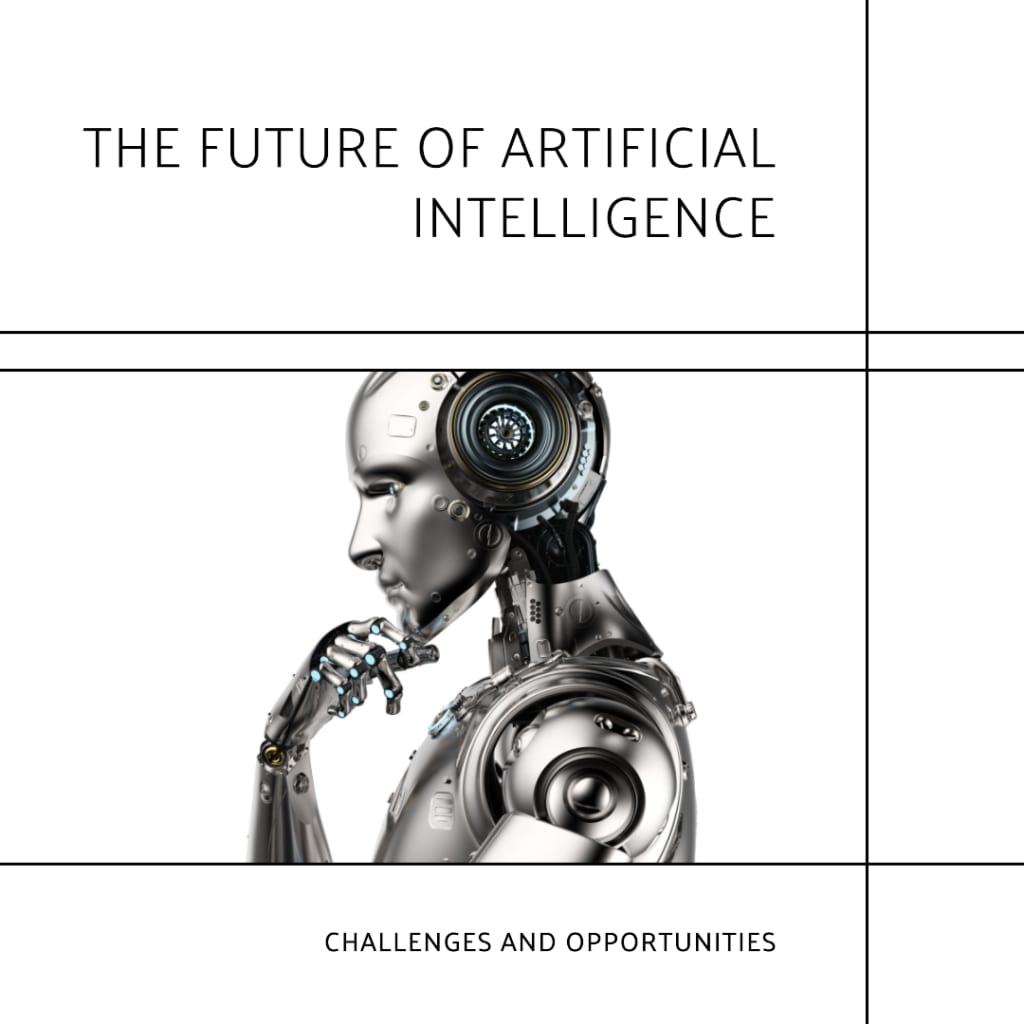
Introduction:
Artificial Intelligence (AI) has rapidly evolved and is poised to revolutionize numerous industries and transform society as a whole. As we delve deeper into the future of AI, it becomes imperative to explore the challenges it presents and the vast opportunities it brings. This comprehensive article delves into the potential of AI, examines the key challenges it faces, and highlights the immense opportunities it offers for the future.
I. Current State of AI:
Provide an overview of the current state of AI, emphasizing recent advancements and breakthroughs. Discuss the wide range of AI technologies such as machine learning, natural language processing, computer vision, and robotics. Highlight their applications across various domains, including healthcare, transportation, finance, and more.
II. Opportunities Presented by AI:
Explore the boundless opportunities that AI presents in diverse sectors:
a) Healthcare: Discuss the potential of AI in revolutionizing healthcare, such as improving diagnostics, personalized medicine, drug discovery, and patient care. Highlight how AI can enhance early disease detection and treatment outcomes.
b) Transportation: Explore how AI can transform transportation systems with self-driving cars, optimized traffic management, and intelligent logistics. Discuss the potential for increased safety, reduced congestion, and efficient mobility solutions.
c) Education: Highlight the opportunities AI offers in the field of education, including personalized learning, intelligent tutoring systems, and adaptive educational platforms. Discuss how AI can enhance student engagement, tailor educational experiences, and promote lifelong learning.
d) Business and Industry: Explore how AI can empower businesses with automation, predictive analytics, and process optimization. Discuss its potential to enhance decision-making, improve operational efficiency, and drive innovation.
III. Challenges and Ethical Considerations:
Address the challenges and ethical considerations associated with AI:
a) Job Displacement: Discuss concerns regarding job displacement due to automation and AI technologies. Explore potential strategies to address this issue, such as reskilling programs, workforce collaboration, and embracing AI as a tool for augmentation rather than replacement.
b) Bias and Fairness: Highlight the importance of addressing biases in AI systems, which can perpetuate discrimination and inequality. Discuss the need for unbiased and diverse datasets, ethical AI development practices, and transparent decision-making processes.
c) Privacy and Security: Examine the challenges related to data privacy and security in the era of AI. Discuss the importance of robust data protection measures, secure algorithms, and ethical data usage to safeguard individual privacy rights.
d) Ethical Decision-Making: Explore the complexities of ethical decision-making by AI systems and the responsibility of AI developers and policymakers. Discuss the need for ethical frameworks, guidelines, and regulatory oversight to ensure the responsible development and deployment of AI technologies.
IV. Collaboration and Regulation:
Highlight the significance of collaboration between researchers, industry leaders, policymakers, and the public to address the challenges and maximize the benefits of AI. Discuss the importance of interdisciplinary collaboration, knowledge sharing, and global partnerships. Address the need for ethical guidelines and regulations to govern AI development, deployment, and accountability.
V. AI in Governance and Policy:
Discuss the potential impact of AI on governance and policy-making. Explore how AI can assist in analyzing large datasets, identifying patterns, and informing evidence-based decision-making. Address the challenges of ensuring transparency, accountability, and fairness in AI-powered governance systems.
VI. AI and Sustainability:
Examine how AI can contribute to sustainable development and address environmental challenges. Discuss applications of AI in energy optimization, waste management, climate modeling, and resource conservation. Highlight how AI can help organizations and governments make informed decisions to mitigate the impact of human activities on the environment.
VII. AI and Cybersecurity:
Explore the role of AI in enhancing cybersecurity measures. Discuss how AI can detect and prevent cyber threats, identify vulnerabilities, and strengthen network security. Address the challenges of AI-powered attacks and the need for continuous innovation in cybersecurity to keep pace with evolving threats.
VIII. AI and Ethics in Autonomous Systems:
Discuss the ethical considerations surrounding AI in autonomous systems. Address concerns related to AI-powered autonomous vehicles, drones, and robots. Explore the challenges of ensuring safety, accountability, and ethical decision-making in autonomous systems. Highlight ongoing research and initiatives to establish ethical frameworks for AI in autonomy.
IX. AI and Healthcare Revolution:
Delve deeper into the transformative potential of AI in healthcare. Discuss the use of AI in medical imaging, disease diagnosis, treatment planning, drug discovery, and personalized medicine. Highlight the opportunities for improving patient outcomes, reducing medical errors, and enhancing the efficiency of healthcare delivery systems.
X. AI and Social Implications:
Examine the broader social implications of AI adoption. Discuss the impact of AI on employment, income inequality, and social dynamics. Explore potential strategies to address the socioeconomic disparities that may arise from widespread AI adoption. Emphasize the importance of inclusive policies and measures to ensure that the benefits of AI are accessible to all.
XI. Ethical AI Development:
Delve into the principles of ethical AI development. Discuss the need for transparency, fairness, and accountability in AI algorithms and decision-making. Explore the concept of explainable AI and the importance of human oversight to prevent AI from perpetuating biases or making unethical decisions.
XII. AI and Creativity:
Highlight the emerging field of AI-driven creativity. Discuss how AI can enhance artistic expression, music composition, storytelling, and design. Address the concerns and debates surrounding the role of AI in creative industries, such as copyright infringement and the authenticity of AI-generated content.
XIII. AI and Global Collaboration:
Explore the potential for international collaboration in AI research and development. Discuss the benefits of sharing knowledge, resources, and best practices across borders. Address concerns related to data sharing, intellectual property, and the role of AI in geopolitics.
XIV. Continuous Learning and Adaptation:
Discuss the importance of continuous learning and adaptation in the field of AI. Explore the concept of lifelong learning for AI systems to ensure they stay up-to-date, adapt to new challenges, and remain relevant in rapidly evolving domains.
Conclusion:
Summarize the key points covered in the article, emphasizing the transformative potential of AI, the challenges it poses, and the need for responsible AI development. Highlight the importance of interdisciplinary collaboration, ethical considerations, and ongoing research to shape the future of artificial intelligence in a way that maximizes its benefits while addressing the associated challenges.
About the Creator
ibraheem
Hi i am ibraheem and i have a great interest in stories and publish stories. I love these types of stories like fiction, horror, technology, nature and many more. So i hope you will love to read my stories. Thanks.






Comments
There are no comments for this story
Be the first to respond and start the conversation.